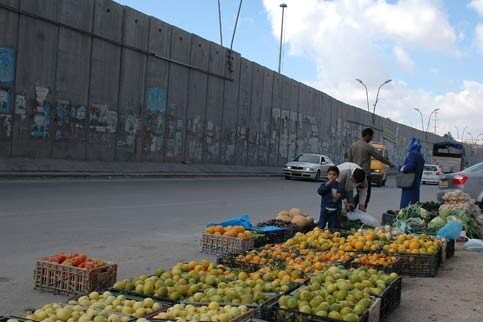B'Tselem 27 November 2006

Palestinians buy goods near a part of the separation wall in Al-Ram neighborhood on the edge of Jerusalem, November 22, 2006. (MaanImages/Moamar Awad)
Until May 2002, citizens and residents of Israel (including residents of East Jerusalem) married to residents of the Occupied Territories could request a legal status in Israel for their spouse and that their children be registered in their identity cards and as residents of Israel. In May 2002, the government of Israel decided to freeze the handling of requests by Israeli residents for family unification with Palestinians from the Occupied Territories. On 31 July 2003, the government’s decision was enshrined in the Nationality and Entry into Israel (Temporary Order) Law, 5762 - 2003. The Law - and the interpretation given it by the Interior Ministry - denies many children, those with one parent who is a resident of Israel and the other a resident of the Occupied Territories, the possibility of obtaining a permanent status in Israel.
Children between the ages of fourteen and eighteen, to whom the Law applies, are not allowed to obtain a status in Israel, even if they live inside Israel with a parent who is a resident of Israel. They are only entitled to a permit to stay temporarily in Israel. This permit is given for short periods, of three to six months, and does not entitle the minor to any social rights. To obtain the permit, the parent must prove that the child’s center of life is in Israel. When they reach eighteen, they are liable to lose their entitlement to the permit.
As for children under the age of fourteen, the Law allows granting them status in Israel, but the Interior Ministry issues them only a “temporary-resident” visa. This visa entitles the child to all the social rights to which permaanent residents are entitled (among them social security and national health benefits), but the visa is good for only two years. Here, too, the parent must prove that the child’s center of life is located in Israel. The Interior Ministry refuses to indicate how it will treat these children after the two years have expired: will it upgrade their status to permanent resident or will it take away their “temporary-resident” status?
The Law also impairs the children’s freedom of movement. Many of these children are delayed and harassed at checkpoints between the West Bank and Israel, particularly at checkpoints entering and exiting East Jerusalem, despite the permits in their possession. The Law also prevents children over eighteen who are living with their parents, but do not have a permit, from living a normal life - working, marrying, and the like - alongside their families and without the constant fear of deportation.
Occasionally, the Law results in siblings holding different statuses: some are permanent residents, others are temporary residents, and some hold temporary permits. This situation impairs family stability and relations among the family members.
In May 2006, the High Court of Justice rejected several petitions opposing the Law, among them petitions filed by Adalah, the Association for Civil Rights in Israel, and HaMoked: Center for the Defence of the Individual. In rejecting the petitions, the court accepted the state’s official explanation that the sole purpose of the Law was security related, despite the public statements of state representatives and cabinet ministers that the real objective of the Law was primarily demographic. The High Court also ignored the severe harm that the Law causes to children.
The Law violates the best interest of the child and the right to family life, which are enshrined in the Basic Law: Human Dignity and Liberty and in international law. The Law also discriminates between the children of Palestinian residents and citizens of Israel and the children of residents and citizens who are not Palestinians.
HaMoked: Center for the Defence of the Individual and B’Tselem call on the Knesset to repeal the Law. At least, its sweeping application to minors should be repealed. The Interior Ministry must promptly start registering children again, in an efficient manner based on the merits of the particular case, recognizing the right of all residents and citizens of Israel to live with their children where they choose.
Related Links